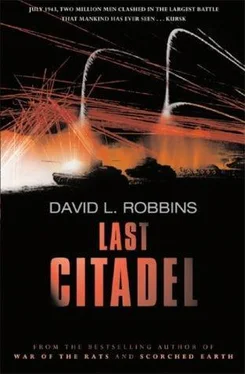Luis and the Czech stood behind the slowly receding train. The major trundled to the end of the steps and held on, hesitant to jump down to the moving ground, then hopped off, almost stumbling on the rocks. Luis looked at the Czech. The boy was eager like a dog, to fetch, to chase.
‘Go,’ Luis said, releasing him with his voice and an open hand. The boy ran off behind the train, to get his portion of the kill.
Luis strolled behind the train, over the tracks he’d run across just two minutes before. He walked over to the major, caught his elbow and walked him forward along the tracks.
‘Shouldn’t we stay back here?’ the major asked, confused and apprehensive.
‘It’s safe, Major.’
To punctuate this, small-arms fire erupted out of the night from up the tracks. Luis walked beside the officer, listening and calculating when the train would pass beyond the partisans’ defused bomb. Gunfire spurted on both sides of the rail line, automatic weapons unleashed their rat-tat-tat , then gave way to single reports, then nothing. It was over. The train was safe.
‘What did you do?’ Major Grimm inquired. The man walked with both hands clasped behind his back, buttoned and belted belly out. His double chin hid part of his collar. Luis felt a twinge of vexation at this Wehrmacht officer, who carried on him as extra all the weight Luis had sacrificed, who cowered in his compartment until even that became unsafe, while others – SS men all – ran ahead into the dark to engage the enemy.
‘Once I found the place where the partisans wanted to blow the tracks, I cut the wire to their explosive. Clever idea they’d come up with, to wreck only one rail and spill the train on its side. They spotted me at the last second and I ran back to the train.’
‘Those were the first gunshots, then. Them shooting at you?’
Nothing was said about the dropped Luger. Luis caught himself drawing up his posture, gaunt shoulders back, he took longer strides, the peacock walk of the matador . He had lain in hospital beds for months, tottered with canes for more months, suffered in sanitary surroundings through seasons of battle news from the front, and now this night marked his return to the war. Luis preened and strolled and talked.
‘In addition to escorting the Tiger tanks, I’m also bringing a company of reinforcements to Leibstandarte . Once I was sure where the partisans were located, I sent each of the four platoons ahead. Two platoons were ordered to take positions between the tracks and the trees. Two more were to penetrate the woods and come out behind the Russians in the fields. The train drove between them. The Tigers were protected by twin machine-gun redoubts on rail cars.’
‘The tarpaulins.’
‘Yes.’
‘Ah, I wondered what was under those sheets.’
‘Guns, Major.’
‘Yes, of course. Well, this is a war. What does one expect?’
‘Once the train was safe, the first two platoons entered the trees to flush the partisans away from the tracks and back toward the fields. When the Reds ran out from cover to disperse, the second platoons were waiting.’
‘It sounds like a quail hunt,’ the major said with approval.
‘Actually, a pincer action.’
‘Yes, well, it doesn’t matter. The tanks are safe. And so are we, I assume?’
‘Yes.’
‘Good. Good.’ The major clapped Luis on the back, celebrating his own closeness to danger and his survival in the graces of this little SS captain. There was something condescending in the slap on the back, Luis thought; it carried the flavor of a German officer thanking a Spaniard for a job well done in the service of Germany. There was also a hint of surprise, as though Luis were too much a runt to be this brave and effective.
They approached the place on the tracks where the partisans had set their bomb. The log was still smeared with the gray explosive on one side, the blasting caps and wire were helpless deposits beside the rail. Major Grimm studied the set-up and clucked his tongue.
The locomotive sighed in the dark around the bend. As per Luis’s instructions, the tram halted a half mile away. Dawn would overtake them in another hour. Luis would roll with his Tigers safe and on schedule into the ruins of the Oktabrskaya station. The rails there would be repaired before the day was out. The tanks were too valuable to leave them at a rail station thirty miles from the front.
The two hundred SS grenadiers he’d unleashed into the woods began to return to the tracks. They came crashing through the underbrush carrying the bodies of dead partisans, as they’d been instructed. One by one, the carcasses were tossed like sacks onto the slope of the rail mound. Luis walked along the line of bodies, the Germans laid them out spaced neatly. The partisans would be found like this. Their ruse to blow the tracks was discovered and averted. They might suspect they have a spy in their cell and tear themselves apart looking for him. Perhaps not. No matter. Even if they found the informant, he’d be easily replaced. The Gestapo were masters of persuasion.
He walked the line of corpses. He expected to see many forms of one man, the simple Russian peasant roused to fight the European invader, knobby-handed laborers, shaggy beards and moustaches under close-cropped hair, tattered clothes and savage expressions even in death. These freshly killed ones were civilized, and Luis found that odd. These partisans were not starved, their clothes were not ragged. The weapons collected by the grenadiers were first-rate, front-line rifles, oiled and loaded. A handful of the partisans had been young men, perhaps soldiers slipped into the conquered lands to provide the partisan cells with professional training and leadership. Most were older, with determined looks frozen on them in repose. Luis kicked the boots of one; these were new boots, good leather all around.
Major Grimm came to his side.
‘They’re getting stronger,’ the major observed.
Luis nodded. He’d been briefed that the Russian partisan movement was disorganized, tattered. These corpses gave the lie to that intelligence. These men lying shoulder to shoulder on the gravel had been supplied, supported, led, emboldened. Their kind of fury was fed by the harshness of Germany’s occupation, the stench from the death camps, and the lunacy of taking these people lightly, something Luis had sworn long ago he would not do again.
Thirty-six bodies were lined up. Luis saw the determination and efficiency of the SS troopers daubed somewhere on each one, each corpse a quick tale; a short run to somewhere ended in being shot down. A wound in the neck, several in the chest or abdomen, many coats had no rents, their bullets were in the back. At the end of the row of partisans lay one SS soldier. Over him stood the Czech private.
‘Your friend?’ Luis asked.
The young soldier nodded. The dead grenadier, too, had the Czech flag on his sleeve. One stained rip dotted the dead boy’s jacket, the hole darker than any night.
‘Go get the train,’ Luis ordered the soldier. ‘Tell the engineer to come back.’
The soldier said, ‘Yes, sir.’ With what seemed like no effort he reached down for his comrade and slung the corpse across his shoulder. He walked off down the rail ties with his cooling burden.
A sergeant from one of the platoons presented himself to Luis and the major beside him.
‘Report, Sergeant,’ Luis instructed.
‘A few got away, sir, no more than four or five. But we’ve got these here who surrendered.’
Behind the sergeant stood three partisans. These men hung their heads, making Luis think of a bull when he and the picadors were done with it. But these men were captive and afraid and for Luis that was their difference from the bulls, animals that were never afraid. He moved close to the three. They smelled. He curled his nose at fear and dirt, cheap wool and vodka. He never hated the bulls when he fought them, he and every man inside the ring respected and loved the beasts for their courage and how hard they died. He tried to keep his anger from quaking his hand when he held it out for the sergeant’s pistol. The soldier laid the gun in Luis’s palm.
Читать дальше












